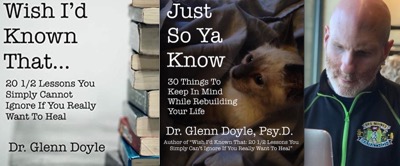
Dr. Glenn Patrick Doyle
@DrDoyleSays
Psychologist; @SEEKSafely Board President; marathoner. Realistic, sustainable trauma & addiction recovery. One day at a time.
The best minds in mental health aren't the docs. They're the trauma survivors who have had to figure out how to stay alive for years with virtually no help. Wanna learn how to psychologically survive under unfathomable stress? Talk to abuse survivors.
A powerful, underappreciated trauma & addiction recovery tool is a home or sleeping environment that is comfortable & contains reminders of who we are, our purpose, our values, our heroes, & our inspiration. Make whatever space you have into your emotional & spiritual home base.
In trauma recovery it's real important we surround ourselves w/ people who both believe us when we say things & also call us on our BS (Belief Systems-- also our bullsh*t). "Supporters" who struggle with either of those aren't going to be much help to us.
Trauma & addiction recovery are very much about mindset. Not because trauma or addiction are "all in our head," but because mindset-- our knowledge, skills, attitudes, & philosophies surrounding trauma & addiction-- WE can proactively shape & develop. It's a thing WE can change.
Be on the lookout for trauma or addiction trying to give you "reasons" to quit recovery. "Was it really TRAUMA, though?" & "Am I really an ADDICT, though?" are often our struggles trying to nudge open the door to, "Maybe I don't REALLY need this 'recovery' thing..." Red flag.
People don't understand: being kind & fair to yourself is in no way the "easy" path, not when you've been conditioned by abuse & neglect to shame, blame, & beat the sh*t out of yourself. Self-respect & self-care is the path of discipline & courage-- not "coddling" or "excuses."
It's going to take awhile for supportive self-talk to feel normal or comfortable. Most of us survivors & addicts in recovery are used to internal dialogue that is cynical, sarcastic, & critical. Honing an internal voice that is supportive AND authentic is going to take a minute.
Nobody recovers from trauma or addiction because they're "worthy," & nobody struggles w/ recovery because they're "unworthy." Recovery isn't about "worthiness"-- it's about WILLINGNESS to relate to ourselves w/ patience & compassion, often when we feel LEAST "worthy" of them.
There is no rule that says you have to hit "rock bottom" before recommitting to sobriety or recovery. Take it from me: the longer you're off the path, the harder it is to get back on. Don't turn a speed bump into a spiral. Just do the next right thing. No shame.
It is possible to take full responsibility for our choices & recovery, and also refuse to buy into self-victim-blaming & gaslighting. Don't get bullied by "tough love" & "personal responsibility" fetishists into thinking you have to choose.
The fact that you struggle to ask for or accept help doesn't mean you don't "deserve" it. It means you've been conditioned to not ask for or accept help-- no more, no less. Challenging that conditioning is going to be awkward. Let it. This is how we change our brain-- & life.
It is not weird or wrong to need or take extra time to identify & process your feelings. The world is going to try to rush you & disconnect you from what you feel & need. Don't let it. Slow down. Push pause. Check in w/ & listen to your body, your "parts," & your higher self.
"I accept where I am, what I feel, & what I need in this moment without judgment." Take-- make-- moments to say it to yourself throughout the day. Put it on repeat. Remember that trauma & addiction recovery is about reprogramming, & reprogramming requires purposeful repetition.
Plan moments of quiet, meditation, prayer, whatever recharges you, into your day. Our days in trauma & addiction recovery are wars of energetic attrition, & we can't leave opportunities to regroup & re-regulate ourselves to chance. Plan them & follow through w/ them.
Avoidance isn't always "bad." It's an intelligent recovery decision to avoid people & situations that trigger us, but don't offer any upside to engaging w/ them. Our mental & physical bandwidth is too precious to waste confronting triggers for the sake of confronting them.
No trauma survivor I've ever met has felt "entitled" to attention, understanding, or care. Quite the opposite, most of the time. That said: survivors in recovery can be enormously sensitive to whether people walk their talk & follow through on promises-- as a matter of safety.
Feeling invisible can be a trigger for many trauma survivors, of neglect especially. Feeling seen can be a trigger for many trauma survivors, of physical & other types of violent abuse especially. Triggers aren't random or "chosen." They're specific to our wounds.
You're not as bothersome or burdensome as Trauma Brain is trying to convince you you are. Yes, you might bug some people-- but so does every human. Our conditioning tries to tell us we're a huge inconvenience for breathing, that everyone resents-- but that's BS (Belief Systems).
Blog: "The lives of survivors who struggle with PTSD or CPTSD are entwined with pain, often physical as well as psychological. Is it any wonder that, in our pain-phobic culture, trauma survivors often find ourselves misunderstood and mocked?" useyourdamnskills.com/2025/07/22/inj…
Suicidal ideation, both passive & active, is this phantom hanging around the lives of many trauma survivors that we often don't dare talk about-- because we don't want to alarm, upset, or activate people in our lives who don't understand what it does & doesn't mean.

